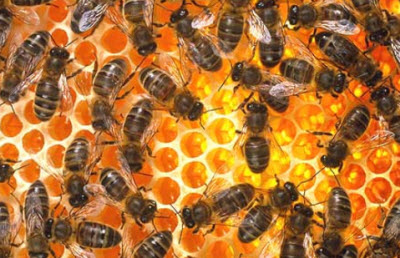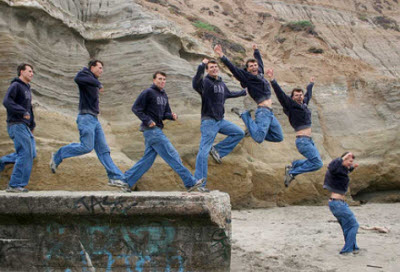 Will Wright’s games from SimCity to The Sims have sold more than 100 million units. That’s why people are paying attention to his new startup and game idea, HiveMind. The Berkeley, Calif.-based company is focused on “personal gaming,” or a kind of title that can customize itself for the individual player, taking into account aspects of a player’s real-life situation as elements of the game.
Will Wright’s games from SimCity to The Sims have sold more than 100 million units. That’s why people are paying attention to his new startup and game idea, HiveMind. The Berkeley, Calif.-based company is focused on “personal gaming,” or a kind of title that can customize itself for the individual player, taking into account aspects of a player’s real-life situation as elements of the game.
We talked to Wright about HiveMind earlier this week in an exclusive interview, but we also thought it would be great to show you Wright’s own words, as he has a HiveMind like no one else. Here’s an edited transcript.
VentureBeat: Why don’t you start by telling me about where you are with HiveMind?
Will Wright: We have been exploring all this stuff with the Stupid Fun Clubs, and we really started diving into this idea over six months ago. And really this has to do with where gaming is going in the future. This is one of these things where we want it to be totally focused and have it be something that we can scale up in a big way. We are actually planning to launch this as a separate company entirely, a spin out from the Stupid Fun Club.
 VB: Tell us about it.
VB: Tell us about it.
WW: The gist of it is, we are trying to do what I am kind of calling personal gaming. We have had different eras in gaming like console gaming and social gaming. This isn’t really a platform-based concept, although a lot of it will be happening on mobile devices. A big part of it is how can we learn enough about the player to start crafting games about their real life. Rather than craft a game like FarmVille for players to learn in play, we learn about you and your routines and incorporate that into a form of game play. Rather than put you in a fictional sand box, how do we make a game about the things that you do all the time?
It is something that is with you all the time, especially with your real life, almost like you are Sim. Your regular routines, your locations, your friends can all be incorporated into a form of game play. And a big part of this really, I think, is how do we make reality more interesting to you. What we are saying is, how do make a game that gets you more engaged in reality rather than distract you from it? And so we use reality as the basis of the game play and a lot of these opportunities that surround you.
I had this epiphany about a year ago. I was in Burbank and I was waiting to give a talk and I was about an hour early and I walked down the street. There was like this old fifties diner. I had an hour to kill, so I just walked down there because I liked the sign. In the parking lot were all these guys with really cool sports cars. They were sitting on lawn chairs. I asked what they were doing, and it turned out that the last Friday of the month, these guys would get together in the parking lot and just bring their cars and sit and talk about cars. And I love cars, so I had a great time just walking around talking to these guys looking at their cars. And it occurred to me later that my life is probably surrounded with possibilities like this, opportunities that I am just not aware of. There is this opportunity space that surrounds me. If I understood the things that were accessible to me, if I knew about these events, my life would probably be a lot more interesting.
And that’s kind of the concept here. How do we expose you to these events? How can we make a system that understands enough about you and gives you really deep situational awareness? It could take into account what time of day it is, where you are, how much money is in your pocket. Imagine if you could open Google Maps and it shows you things that are interesting to you on the map.
These things might be of tremendous interest to you. It might be an event, it might be a place, its might be some historical footnote, it might be some person that you went to high school with. Whatever it is, all these things that you trip across serendipitously — how can we make a system? All of these things are very different dimensions that this kind of matchmaking would occur through. Are you following me so far?
 VB: Yeah. It’s interesting.
VB: Yeah. It’s interesting.
WW: Another way to look at this is like in mapping software. Google Maps will show you where are in two dimensions, and it can show you what’s near by geographically. But when you think about the things that really kind of moderate your interest or your accessibility or availability to different experiences or opportunities, there are a lot more dimensions to that map. There’s probably at least like 50 dimensions in that map. And those dimensions would be things like your interests, your social network, the time of day. All of the factors that I talked about you can envision as other dimensions on a much higher dimensional map.
And so one of the things we want to do is be able to triangulate a player in those 50 dimensions plus have a deep map of the world on these dimensions. And there will be a lot of data in there that’s not even up on the cloud yet. We want to build a game and entertainment activities that can actually help us build a 50-dimensional map and locate the players in it. And then we use that opportunity space for really interesting new forms of entertainment. It might blur entertainment, lifestyle and personal tools. With that data, the world and the opportunities for entertainment become more visible to you. A part of this is really getting a deep relationship with the user, really understanding a lot about them and even designing games to where we are actually specifically trying to learn aspects of the user that are not really captured by anybody else. It may capture issues with their psychology, their interests, their background, their history, their social networks, etc. We can use those to build a number of different gaming applications around you.
This suite of gaming applications is basically harvesting this 50-dimensional map.
VB: So are there some examples of this idea that do bits and pieces of this in the real world already? Even the simple idea of location-based mobile search seems like it could deliver some of this data to you.
WW: A couple of things I’ve seen in the last month or so are these dating apps, where it’s looking for somebody that matches your interests that also happens to be within a quarter-mile of you. So in that case it’s looking at maybe five dimensions. Not just where you are, but also looking for people around you that have shared interests. That’s a very simple example of something like that; there have been a lot of location-based things that have a very thin game layer on top of them, like Foursquare. Those really started out as utility tools or mapping services, where the people who were working them were technology driven, and they don’t really go deep into gaming psychology. So they will put in an achievement ladder and that’s that. That’s the game, which is where Foursquare is.
We’re looking at how we build much deeper, more involving gaming experiences. But we build them out of the real world rather than the fantasy worlds.
 VB: What are some examples of those 50 dimensions you’re talking about?
VB: What are some examples of those 50 dimensions you’re talking about?
WW: Oh, we’ve got lists. You can imagine a lot of them. Imagine anything that would describe the things that would be of interest or available to you at any specific time and location. So your location is obvious, the time of day is another one, your interests, your skills, people, how much money is in your pocket, what your current mood is, which is actually a very important one. We wanted to design a gaming application that in some sense can start tracking and predicting your mood and even your schedule. It can understand when you go to work, when you have lunch, what times you are free that day. It can have access to your schedule and know what you have planned for the rest of the day.
These are all things that would be specific to you that will triangulate you on the 50-dimensional space. The map is the rest of that space and is basically showing you a proximity to other things, but any parameter about you — a lot of it really involves deeply personal stuff like your mood, state of mind, your schedule and stuff like that. But over time we want to extract this stuff out so that we know you are into a very specific set of things. We might know that other people are into very similar kinds of specific things, and we can track what they’ve done. We can match those interests and then recommend them to you.
We can kind of go with those 50 dimensions — and 50 is really just a number I pulled out of a hat. It’s just the way I think about building out a profile of a user.
VB: So it almost seems like doing some data mining and then building the game around that?
WW: Well, it’s actually almost the opposite process. We want to build games that allow us to mine that data. I have all these apps where they ask stuff like, can I use your location. I usually say no. That’s actually a generational thing. I have noticed how many people who are like 20’s and 30’s have much less concern about privacy relating to apps. One of the things we have to be really cognizant of is that we want to basically get the user on our side in that, any time they share data with us, they immediately get value back. They get entertainment back. And so we reward them heavily for every bit of data they give to us about themselves. And that’s crucial and we will again have different types of gaming apps, but almost every one of them in some sense wants to contribute to data mining, either mining data about you individually or mining data about the world around you.
So in the example I gave about when I was down in Burbank, the fact that these guys meet in that parking lot the last Friday of every month — maybe that’s posted on a web site somewhere, but it’s not in Google Maps. It is things like that we want to basically make accessible within our 50-dimensional map. It is the data we want to capture so that somebody might be playing a game where they are trying to recommend things for me. My friends are kind of playing me like a Sim. And they can see my current needs. They can see how bored I am or how tired I am and they are competing to give the best recommendation to me. And the ones that give me the best recommendation earn “karma points.” They get more attention focused on them, basically for making my life more interesting.
But as they are doing that, as they are giving me these suggestions, we are also capturing the data into the map and retaining it for later, so it might be several months later some other guy is standing on the corner and he is into cars and then the system understands somebody once suggested that these guys meet in the parking lot on the last Friday of every month. I am going to reuse that recommendation. And so this is an example of how we start building the data set out of entertainment experiences.
 VB: Sounds like you are sort of bringing a Sim to life here.
VB: Sounds like you are sort of bringing a Sim to life here.
WW: Kind of. In a way. But we are really kind of making it a real-life endeavor. A lot of it is going to be not just this system and you but it’s also going to be getting your friends involved. Have you ever seen the sort of sub-community that has sprung up lately in the Bay Area called the “quantified self“?
VB: Yes. Isn’t Gordon Bell of Microsoft into that as well?
WW: Yes. These people build these elaborate data sets on their personal life, and they look for patterns or insights. They share them. Most people are doing their own data sets or counting calories or figuring out how much time they spend doing email or whatever the weird thing is they love, basically capturing metrics about themselves and then figuring out how to interpret the data. And that’s exactly what we want to do. People in general are very narcissistic, and so the more we can make this whole thing about you, the more we can get people emotionally attached to it. And so this is kind of back to the idea that we make the game out of you and your life and so, intrinsically, your gaming experiences should be as interesting to you as your dreams, because they are going to be deeply personal.
VB: Yeah.
WW: And so that’s kind of what brought us to start thinking of this as what we are calling personal gaming. How do we make games that really are about you and your life?
